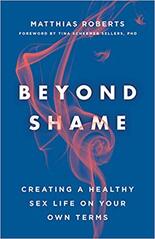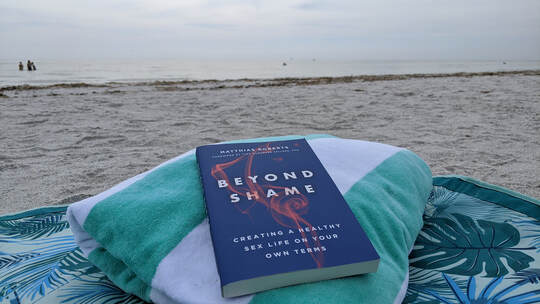 I was so excited to learn that Matthias Roberts would be publishing a book. My faith and sense of self have been nurtured over the past few years as an active listener of his podcast Queerology: A Podcast on Belief and Being. I was eager for the wisdom he’d be bringing into the world, now in literary form! And yet, the immediate feeling I felt when receiving his book for my advance review was not excitement. In fact, my first thought when opening the package was this: “I wish it had a different subtitle, because I’m not going to be able to carry this thing with me anywhere I go." The title of the book, “Beyond Shame,” seems innocent enough, doesn’t it? Perhaps it brings to mind the thoughtful, deep-probing work of Brené Brown, and for good reason: she essentially brought the study of shame to the mainstream. (As an aside: never fear! She’s quoted several times by Roberts in his text). The subtitle, on the other hand? “Creating a Healthy Sex Life on Your Own Terms.” *shudders* It turns me off from wanting to read it. It’s embarrassing. It’s… shame-inducing? And this is Exhibit A of why the book is so important. I wouldn’t consider myself an expert in the field of gender and sexuality, per se, but I am a self-proclaimed progressive, well-informed, open-minded person who is fairly well-read on such topics. Nevertheless, my first reaction to this book’s (straightforward and descriptive) subtitle was almost visceral. I recognized it immediately: I was feeling shame. Insidious shame. From the mere thought of holding a book with the words "healthy sex life" emblazoned on the cover. The truth is that all of us -- even the most sex-positive individuals -- carry a degree of shame around the areas of sex and sexuality. That shame is, in large part, the result of deep-seated cultural norms rooted in centuries of rigid, Victorian-era history. It’s the result of a lack of comprehensive sexuality education in public school systems. And for those who were raised in conservative evangelical Christian homes, churches, and communities, it’s magnified substantially, because one’s notion of good and bad becomes indelibly linked to one’s adherence to a strict religious code. I, as a born-and-raised PC(USA) Presbyterian from Central Pennsylvania, was not brought up in the evangelical tradition myself. I give thanks to God for the ways my childhood congregation nurtured my faith. Nevertheless, I remember elements of “Purity Culture” arising all around me - from middle school health classes, to church youth group conversations, to a series of… ahem… “spirited debates” with my friends’ parents as I advocated for LGBTQ equality in my high school years. Those experiences undoubtedly played an important role in a sense of shame that would require many years to resolve. In some ways, that work still continues. In Beyond Shame, Roberts makes use of a variety of vignettes and conversations in his friendships and with his clients (always with confidences maintained, of course). In so doing, he is bringing words to the shame and trauma that, for many, has mostly just existed in the shadows of the soul. I found myself able to relate to some of these vignettes. Others were far from my own experience, but serve as opportunities for teachable moments. Speaking of teachable moments: Roberts spends a lot of time talking about the science of sex, of connection, and of shame. Seriously. There’s an entire chapter dedicated to the chemical and hormonal reactions occurring through physical and emotional connection. Perhaps those natural reactions and desires will lose a touch of their persuasive power simply by knowing that they’re there. At the very least, it’s helpful to recognize that there are physiological components operating behind the scenes of every interpersonal connection. The factual, research-based, scientific knowledge Roberts provides is not meant to coerce or convey a “right” way of being. Throughout the text, he strives to never make blanket statements or value judgments. He avoids projecting his own ethical code onto us as readers. He simply wants readers to be well-informed about matters of psychology, physiology, and gender, so that readers can formulate their own sexual ethic. In other words, like a good therapist, he wants us to do our own work. Roberts is also clear about what is his work to accomplish, and what is not. One of the things I really appreciate about his writing is a keen awareness of his own perspectives, biases, and blind spots. He writes as a white, gay, cisgender man, raised in a conservative Christian home, who went on to study theology and now serves as a psychotherapist. That is to say, when he addresses topics beyond his own experience -- sexual abuse, religious trauma, feminist and womanist perspectives, to name a few -- he clearly cites additional resources of first-hand accounts - deferring to them and amplifying their voices and experiences directly. This is a class act. There is much to appreciate in Beyond Shame, and I say that as someone who has been exploring these topics for years. I sense that the book’s primary audience, however, is likely to be so-called “exvangelicals” who are recovering from trauma in more conservative, Purity-Culture traditions. Thus, some readers may very well discover that this text helps them to connect the dots of their lives for the first time. Perhaps some readers will discover, in a new way, their own value and worth as a child of God, created in God’s image. Perhaps this text will encourage some readers to start doing their own work -- taking the first steps toward healing. In my view, that makes this an important book, indeed. Beyond Shame launches TODAY, January 7, 2020! Get it on Amazon or at your local bookseller. (Bonus: if you buy the book before January 10, you have access to all the pre-launch bonus materials! Visit matthiasroberts.com/beyondshame/ for more information.)
I'm grateful to Fortress Press, an imprint of 1517 Media, for the invitation to be a part of the Beyond Shame launch team and for sending an advance copy of the text. Comments are closed.
|
AuthorI'm a husband, father, news junkie, theatre lover, enneagram enthusiast, bi advocate, amateur foodie, wannabe barista, and an ordained pastor in the Presbyterian Church (USA). LocationBoise, Idaho
LinksCategories
All
CopyrightAll works by Rev. TJ Remaley on this website are licensed under a Creative Commons Attribution-ShareAlike 4.0 International License
This blog is maintained personally by me and does not necessarily represent the views of any congregation I have served. Every effort is made to give proper attribution for quotations, images, and other media used on this page.
|




 RSS Feed
RSS Feed